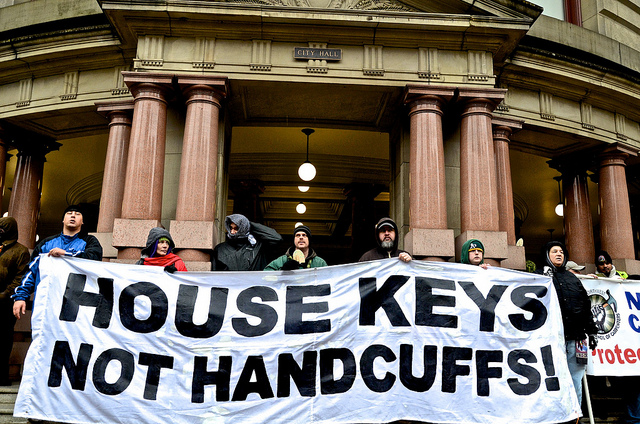By Vargus Pike
There is a side of the Occupy movement that does not consist of street marches and confrontations with police. It doesn’t involve the occupation of parks or shipyards. It is a side that receives little to no press, but in the end may be one of the most important aspects of the movement: The community meeting. There are scheduled meetings listed practically every night of the week on the Occupy Portland Calendar. Some are planning meetings, some are lecture meetings, some are for team-building. There are also community cell meetings that do not make it to the calendar–small groups, quietly working behind the scene to network, organize and create change.
One such group has been holding regular meetings since the eviction of the parks last November. Comprised of professional 50-something suburbanites, this group has been focusing on the foreclosure crisis that has been poisoning neighborhoods throughout Oregon and much of the rest of the country. The most recent meeting lasted 2-1/2 hours. The first agenda item was a presentation by Fiona R. Fiona is a hardscrabble landlord who owns three properties in Portland. These properties are her sole source of income. Somewhat shell-shocked by recent experiences, she was present to tell her story in the hope that it could help others.
According to Fiona, her problems started last November when two of her housing properties went into foreclosure. She described a horrific tale of working with the banks, only to be repeatedly rebuffed — a tale of being given the paperwork shuffle as the banks dangled the carrot of refinancing. Fiona endured delay after delay, while never quite qualifying for the refinanced loan. Meanwhile, the bank proceeded with the foreclosure process, managing to perform that operation with a high degree of proficiency.
It’s a malicious parody of good cop/bad cop, seemingly designed to squeeze as much money as possible out of a homeowner before foreclosure. Fiona also described how the “sharks” begin to move in for the kill, offering short sale “bargains” to entice her to cut her losses and run. So far, Fiona has been able to stave off both the sharks and the banks.
Then in January another nightmare began. Police surrounded one of her properties to serve a warrant on an individual suspected in a gang-related shooting. The SERT team took it upon themselves to enjoy a bit of teargas target practice, firing rounds into the house from every direction, breaking multiple windows, and contaminating it with tear gas residue. Estimated cost of the clean up and repairs to the home — $50,000. Adding insult to injury, Fiona’s insurance company has yet to pay a dime and has dropped her coverage — a classic tale of bureaucratic runaround and denial of service.
Next up was from Rebeca Beeman a community organizer representing We Are Oregon. Founded by Service Employees Union International (SEIU), We are Oregon states on their website, “We’re fighting for a fair economy, where working class people have a voice in our own future, and in how our own communities are run. We see the current economy as inherently unfair, because the priorities of banks, corporations and the rich take precedence in almost every situation over the needs of our families and communities.”
They use multiple tactics in this fight, such as raising awareness of community blight by placing signs in the lawns of foreclosed homes, and performing street theater actions like the one that took place outside Wells Fargo during the F29 day of action. Not coincidentally, three of the members of the community cell meeting I attended were involved in that action. We are Oregon has also flash mobbed banks demanding answers for some of the hapless victims of the good cop/bad cop scenario described earlier. In conjunction with HUD and Economic Fairness Oregon, they hold regular Know Your Rights meetings for homeowners.
An interesting tidbit shared by Rebecca is the fact that banks do not pay property taxes on the homes they foreclose; instead, they defer payment and pass the cost on to the next buyer–sometimes years later. Rebecca disagrees with the common belief that homeowners have brought upon their own grief by buying too much home. She said she sees people faithfully making their payments (often for many years) and then due to misfortune they fall behind and become unable to catch up again.
Last on the agenda was a discussion with Marc Moscato, one of the founders of Portland’s Dill Pickle Club (DPC). The DPC is a not-for-profit organization that is “…working to educate people about the city and provide opportunities to engage in civic dialogue. Such free spaces for open inquiry are rare but represent a real need — and are the kinds of spaces that are crucial to creating an informed and engaged citizenry. These spaces provide the kind of experiences that are vital to the health and well being of a democratic society — the spaces that we should never lose.”
The committee had invited Marc to the meeting to pitch a proposal for a collaboration between the community cell and the DPC. The DPC’s ongoing City Works Poster series, which uses a poster format to describe complex systems, was discussed as a possible template for public education about the intricacies of the ongoing mortgage and foreclosure crisis. Because the financial processes involved are so convoluted and cloaked in mystery, people often get steamrolled by the banks and the legal system. Through outreach, individuals can gain the understanding that the legal system works both ways and then use this knowledge to become empowered to fight foreclosure.
Such are the workings of just one community cell meeting, slowly and inexorably moving towards its goal. This is the heart of Democracy: Groups of people united in common cause to facilitate change. They plan, network, and germinate the seeds of ideas, nurturing them in the hope of a sustainable future for all, not just for the few.







